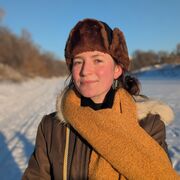- Details
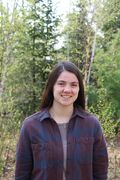 We are very happy to announce a new member of the LOWWSF team!
We are very happy to announce a new member of the LOWWSF team!
Julianna Wanke joined the Foundation in January 2026 as the first Communications and Information Management Specialist.
Julianna looks forward to bringing her creativity towards collaboratively working with the team to develop communications materials for the Foundation and ultimately, increase the environmental network within the watershed. Julianna can be reached at
- Details
 LOWWSF is pleased to announce that our Executive Director, Teika Newton, has been named as one of the 2026 Clean50 Honourees, joining an esteemed cohort of Canada's environmental and clean economy leaders. Teika received the award as an Environmental NGO Advocate, alongside five other peers, during a ceremony in Toronto in mid-October.
LOWWSF is pleased to announce that our Executive Director, Teika Newton, has been named as one of the 2026 Clean50 Honourees, joining an esteemed cohort of Canada's environmental and clean economy leaders. Teika received the award as an Environmental NGO Advocate, alongside five other peers, during a ceremony in Toronto in mid-October.
- Details
The 2025 series of free “Ask An Expert” webinars returns this fall! Please register for sessions of your choice using the links below.
If you have ideas for future topics or speakers, please email us with your suggestions!
October 16 @ 1:00 pm CST: "Understanding Bitumen’s Impact on Freshwater"
Dr. Vince Palace (IISD - Experimental Lakes Area)
October 28 @ 1:00 pm CST: "Microplastics and Freshwater Health: Insights from the pELAstic Project"
Dr.Chelsea Rochman (University of Toronto)
November 4 @ 12:00 pm CST: "Microplastics and Freshwater Health: Lessons from the Great Lakes"
Dr. Karen Kidd (McMaster University), Dr. Eden Hataley (University of Toronto), Dr. Rebecca Rooney (University of Waterloo)
Brendan Spearin (Department of Fisheries and Oceans Canada), Chris Herc & Michaela Novak (Grand Council Treaty #3 Territorial Planning Unit)
Doug Jensen (Minnesota Department of Natural Resources)
December 2 @ 1:00 pm CST: "Algae and Ice: Exploring the Science and Story"
Dr. Andrew Bramburger (Environment and Climate Change Canada) and Andrew Budziak (Royal Canadian Geographical Society / National Geographic Society Explorer)
- Details
Over the two days of the 2025 International Rainy-Lake of the Woods Watershed Forum, we heard from nearly two dozen presenters. Missed the event or want to refresh your memory on these presentations? Now you can take in most of the talks as video recordings, available on our website at the link below!
video
2025 Watershed Forum
- Details
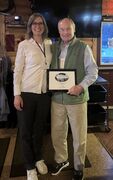 Doug Franchot was awarded the 2025 Wilson Stewardship Award.
Doug Franchot was awarded the 2025 Wilson Stewardship Award.
The Wilson Stewardship Award is presented by the Foundation to individuals, groups, or projects that have made significant contributions to environmental stewardship in the Rainy-Lake of the Woods watershed through:
- Education, outreach, civic engagement and participation in stewardship initiatives or program development.
- Projects or programs focused on protection, restoration, preservation or reduction of environmental impact and development of sustainable practices.
- Details
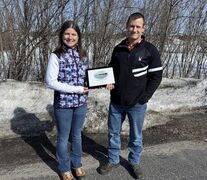 Shane and Kayla Bowe from the Red Lake Department of Natural Resources were recipients of the 2025 Larry Kallemeyn Award, presented the award on behalf of the community of scientists and resource managers from the United States and Canada working in our watershed. The Kallemeyn Award recognizes outstanding scientific contributions to the watershed.
Shane and Kayla Bowe from the Red Lake Department of Natural Resources were recipients of the 2025 Larry Kallemeyn Award, presented the award on behalf of the community of scientists and resource managers from the United States and Canada working in our watershed. The Kallemeyn Award recognizes outstanding scientific contributions to the watershed.
- Details
Meghan Mills (she/her) joined the team to take over the International Watershed Coordinator role in January 2025.
Meg lives on Treaty 1 Territory in Winnipeg, Manitoba, and cherishes time spent off-grid at Pelicanpouch Lake, located on Treaty 3 Territory near Minaki, Ontario. She is thrilled to step into the role, joining others dedicated to protecting our shared waters.
- Details
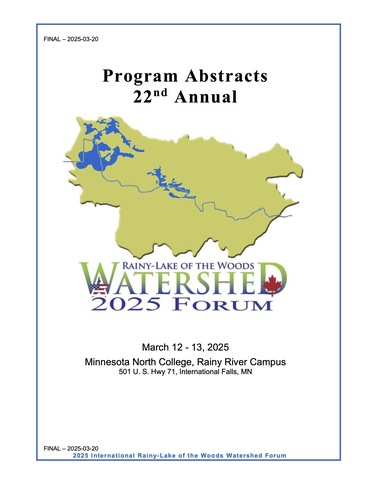 The Proceedings Report of the 2025 International Rainy-Lake of the Woods Watershed Forum is available for download at the Foundation’s website: lowwsf.com/forum-proceedings. Held March 12-13 in International Falls Minnesota, 100 researchers, resource managers, policy makers, and members of the public put Lake of the Woods and its watershed under the microscope.
The Proceedings Report of the 2025 International Rainy-Lake of the Woods Watershed Forum is available for download at the Foundation’s website: lowwsf.com/forum-proceedings. Held March 12-13 in International Falls Minnesota, 100 researchers, resource managers, policy makers, and members of the public put Lake of the Woods and its watershed under the microscope.

